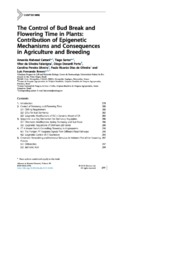The control of bud break and flowering time in plants: contribution of epigenetic mechanisms and consequences in agriculture and breeding.
The control of bud break and flowering time in plants: contribution of epigenetic mechanisms and consequences in agriculture and breeding.
Author(s): CATTANI, A. M.; SARTOR, T.; FALAVIGNA, V. da S.; PORTO, D. D.; SILVEIRA, C. P.; OLIVEIRA, P. R. D. de; REVERS, L. F.
Summary: In perennial plants, the release of bud dormancy, with subsequentflowering, resemblesthe vernalization process ofArabidopsis thalianaand cereals. Especially for perennialcrops from temperate regions, dormancy is an important adaptive trait for both survivaland growth. Exposure to sufficient chilling during winter dormancy ensures the normalphenological traits in subsequent growing periods. Here, we compile research data onmechanisms controlling the overlapping developmental processes that definedormancy induction, maintenance and release, bud burst andflowering. Recentfind-ings highlight the relevance of genome-wide epigenetic modifications related todormancy events, and more specifically the epigenetic regulation ofDORMANCY-ASSO-CIATED MADS-box,FLOWERING LOCUS CandFLOWERING LOCUS Tgenes, key integratorsof vernalization effectors onflowering. The roles of plant growth regulators in control-ling bud break andflowering are discussed in relation to epigenetic mechanisms.A growing body of knowledge demonstrates that epigenetic regulation plays a keyrole in these processes in perennial horticultural and forestry plants. We discuss themost relevant molecular and genomics research that contribute to better understand-ing of the dormancy process and pave the way to precise manipulation of dormancy-related horticultural traits, such asflowering time. Finally, some of the challenges forfurther research in bud dormancy and consequences in agriculture are discussed withinthe context of global climate change.
Publication year: 2019
Types of publication: Book sections
Unit: Embrapa Grape & Wine
Keywords: Chromatin, Dormancy, Epigenetics, Flowering
Observation
Some of Embrapa's publications are published as ePub files. To read them, use or download one of the following free software options to your computer or mobile device. Android: Google Play Books; IOS: iBooks; Windows and Linux: Calibre.
Access other publications
Access the Agricultural Research Database (BDPA) to consult Embrapa's full library collection and records.
Visit Embrapa Bookstore to purchase books and other publications sold by Embrapa.

